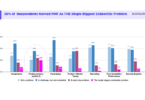Venture capital fund LeadBlock Partners has made its first deal, investing in foodtech and blockchain platform Connecting Food. The food traceability startup recently announced contracts with Mondelez, Herta (Nestlé) and Axereal. It has now raised €2.1 million ($2.3 million) in a pre-series A round led by LeadBlock alongside repeat angel investors.
London and Paris based LeadBlock invests in early stage B2B businesses that use blockchain or Distributed Ledger Technology (DLT). The company was set up in 2019 by three founding partners, including two ex Goldman Sachs equity analysts and researchers.
The new venture firm will focus on Europe and plans to raise a €30 million ($32.5 million) fund. However, to complete this deal, it did a first closing raising money from high net worth individuals, friends and family, as well as ex Goldman Sachs colleagues.
Article continues …

Want the full story? Pro subscribers get complete articles, exclusive industry analysis, and early access to legislative updates that keep you ahead of the competition. Join the professionals who are choosing deeper insights over surface level news.






